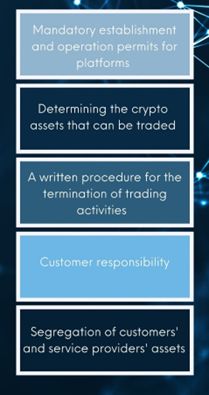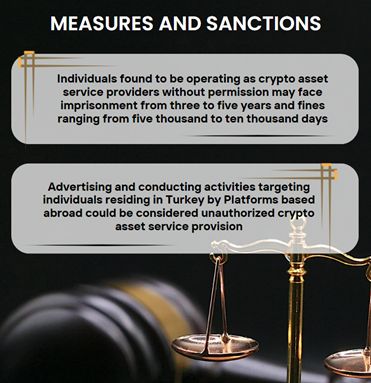- with readers working within the Banking & Credit industries
- within Tax, Energy and Natural Resources and International Law topic(s)
When Laszlo Hanyecz bought two pizzas for 10,000 Bitcoins on May 22, 2010, everyone was curious about the place of crypto assets in the economy. This event, recorded as the first purchase made via Bitcoin, is celebrated every year on May 22nd as "Pizza Day".
In the following years, Bitcoin experienced a significant increase in value, but the mystery surrounding it remained. With the development of blockchain technology, crypto assets became more widespread and are now used by the masses. In fact, we recently witnessed Bitcoin and Ethereum, the most popular crypto assets, reach their highest values in history.
Similar to the all common tools in the financial sector, crypto assets are attracting the attention of regulators1. The ongoing legal battle between the US Securities and Exchange Commission ("SEC") and Ripple, El Salvador's acceptance of Bitcoin as a legal currency, and even some regulations issued by the Central Bank and Financial Crimes Investigation Board (Mali Suçları Araştırma Kurulu) ("MASAK") in our country are some of the developments that point to the existence of this interest2. Undoubtedly, scandals such as the FTX and Thodex also play a role in these regulatory efforts.
In our country, regulatory interest was not limited to secondary regulations, and crypto assets also caught the attention of the legislator. In 2021, a draft act was brought to the agenda of the Turkish Grand National Assembly ("TGNA"), but there had been no developments for a long time. However, as of 2024, the work on the Draft Crypto Asset Act was revived.
The Draft, which envisages introducing regulations on crypto assets to the Capital Markets Act (Sermaye Piyasası Kanunu) , as pointed out3 by the Minister of Treasury and Finance Mehmet Şimşek, was brought to the agenda of the TGNA. According to Şimşek's statement, the aim of the legislation is "to make this area more secure and to eliminate the risks that may arise". We can say that these efforts are also a result of Türkiye's effort to get off Financial Action Task Force's ("FATF") grey list. It can also be noted that FATF's visit4 to Türkiye at the beginning of May will accelerate regulatory efforts in this regard. The Draft submitted to the TGNA in the past weeks was accepted by the TGNA Planning and Budget Committee. On June 26, the Crypto Act (the "Act") has passed on the TGNA. As expected, Turkey has been removed from FATF's grey list on June 28, 2024. Finally, the Act has been published in the Official Gazette July 2, 20245 and entered into force on the same date. The Capital Markets Board ("CMB","Board") has released an announcement on crypto asset service providers. In this context, those who have been carrying out crypto asset service provider activities as of July 2, 2024 and wish to continue to do must submit the information, documents and explanations necessary to the Board, by August 2, 2024.
As mentioned above, significant steps have been taken in regulating crypto assets, especially within the framework of MASAK legislation in our country. However, these efforts are important not only to address the issues of money laundering and terrorism financing but also to protect consumers and investors concerning crypto assets.
In this article, we examine the amendments brought by the Act from the perspective of international developments and needs that may be encountered in practice.
What Does the Crypto Act Bring?
With the Act, some concepts such as crypto assets, crypto asset trading platform ("Platform"), crypto asset custody service, and crypto asset service providers ("Service Providers") are defined for the first time. In this regard, according to the Act:
- Crypto asset is defined as "intangible assets that can be created and stored electronically using distributed ledger technology or similar technology, distributed over digital networks, and representing value or rights."
- The definition aligns with the "value or rights" expression in the European Union's Markets in Crypto Assets Regulation ("MiCA") that was enacted on May 16, 2023. However, rather than use of "intangible assets" term as the Central Bank previously suggests, crypto assets could be more broadly defined using only the term "assets."
- Platform is defined as organisations in which crypto asset trading, initial sale or distribution, clearing, settlement, transfer, custody or any other service related to crypto assets are performed.
- Crypto asset service providers are defined as "organizations that provide crypto asset trading platforms, crypto asset custody services, and other services determined by the regulations issued based on this Act."
- Crypto asset custody service is defined as "the storage of crypto assets or private keys that allow transfer rights related to these assets by crypto asset trading platforms and other custody services determined by the Board."
- The term "key" in this definition is essentially considered to represent encryption. The term "key" refers to encryption in blockchain technologies, and defining it can be seen as a positive step to avoid confusion. As seen, the Act separates entities providing crypto asset services and crypto asset trading platforms. Currently operating platforms are generally subject to the general provisions of the Commercial Code as joint-stock companies, and therefore not under the supervision of the Board. With the Act, CMB will regulate and supervise both, which is positive as it ensures supervision by an expert institution. However, it should be noted that the global trend is to establish separate regulatory authorities for crypto assets.
- Wallet is defined as "software, hardware, systems, or applications that enable the transfer of crypto assets and store these assets or private and public keys related to these assets online or offline."
- Adopting a definition that includes hot wallets and cold wallets frequently used by users is considered an accurate approach.
With the enactment of the Act, CMB will have the authority to regulate crypto assets that provide specific rights related to capital market instruments. The Central Bank will regulate crypto assets accepted as electronic money under payment services and electronic money legislation, and the Ministry of Trade will regulate crypto assets intended to access or represent a product or service.
Additionally, the Act states that crypto assets providing specific rights related to capital market instruments and crypto assets traded on platforms or subject to initial sale or distribution will not be subject to the Act. Service Providers will also be exempt from other provisions of the Act, other than for those explicitly referred to them.
All transactions involving crypto assets will be subject to the provisions of the Turkish currency regulations.

What Rules Will Platforms, Custody Services, and Service Providers Follow?
- According to the Act, it will be mandatory for Service Providers to obtain permission from the Board to be established and start operating. The Board will hold the responsibility of determining the conditions related to the establishment, activities, shareholders, capital requirements, information systems, technological infrastructure, share transfers, and other similar issues of Service Providers.
- Although a licensing requirement is foreseen, details such as minimum capital requirements are expected to be determined through secondary regulations.
- Platforms will be required to pay a fee equivalent to 1% of all their revenues, excluding interest income, to the CMB and TÜBİTAK (Scientific and Technological Research Council of Türkiye) each year.
- According to the Act, Platforms will be responsible for determining which crypto assets can be traded on their platforms. Additionally, they will be required to establish written procedures for determining and terminating the trading of crypto assets on their platforms.
- Under the Act, CMB will have the authority to regulate the principles and procedures regarding platforms, including determining the crypto assets subject to trading.
- According to the Act, to increase transparency and traceability, customer access to wallets and bank account records involved in crypto assets transfers must be kept traceable by authorized institutions.
- According to the Act, customers' crypto assets must be primarily stored in their wallets. For crypto assets that customers choose not to store in their wallets, custody services must be provided by banks authorized by CMB and deemed appropriate by Banking Regulation and Supervision Agency or other institutions authorized by the Board, and customers' cash must be kept in banks.
- This provision essentially contradicts the decentralized nature of crypto assets. Additionally, given that banks are just starting to develop expertise in crypto assets, the effectiveness of this approach is debatable.
- Cash and crypto assets held by Service Providers on behalf of customers will be kept separate from the Service Providers' assets, and records will be kept in compliance with this provision. These assets can not be subject to seizure, pledge, or precautionary measures due to the Service Providers' debts.
- This regulation is significant for protecting debtors' assets and is noteworthy for establishing trust.
- Contracts related to the purchase and sale of crypto assets between Service Providers and customers will be established in writing, remotely, or through methods that enable identity verification of the customer via a computing or electronic communication device as determined by CMB, which shall determine the procedures and principles for these contracts.
- One of the most critical provisions, not included in previous drafts but included in the Act, states that contract terms that eliminate or limit the liability of Service Providers to their customers will be invalid.
- Platforms are obligated to identify their customers before establishing a contractual relationship under the Act on the Prevention of Laundering Proceeds of Crime and other relevant legislation.
- This obligation already exists under the Act on the Prevention of Laundering Proceeds of Crime in our legislation.
- According to the Act, prices on platforms will be determined freely. However, except for transactions related to crypto assets traded on foreign markets, actions and transactions that cannot be reasonably and economically justified and that can undermine the trust, transparency, and stability of transactions on the platforms will be subject to the provisions of the Capital Markets Act, and price freedom is adopted.
The Act maintains the broad liability regime aimed at protecting investors introduced in previous drafts. Service Providers will be primarily liable for damages resulting from illegal activities, defaults in delivery obligations, cyber-attacks, technical failures, operational errors, or abuses by Service Providers' employees to the extent they can be attributed to the Service Providers. If Service Providers cannot provide compensation, their employees will be held liable for damages to the extent they can be attributed to them. Personal bankruptcy can be declared for individuals found liable for damages at CMB's request.
Measures and Sanctions

The Act stipulates that individuals identified as operating as crypto asset service providers without authorization will be sentenced to imprisonment from three to five years and a judicial fine of five thousand to ten thousand days.
Additionally, CMB will have the authority to require Service Providers, whose payment and crypto asset delivery obligations are unmet or whose financial strength is deemed weak, to strengthen their financial structures, temporarily suspend their activities, or revoke their activity authorizations wholly.
Perhaps the most notable sanction is that activities and promotions by Platforms located abroad targeting residents in Türkiye will be considered unauthorized crypto asset service activities. Thus, Platforms based abroad will need to obtain authorization from CMB to operate in Türkiye.
Platforms located abroad must terminate their activities targeting residents in Türkiye within three months following the date the Act comes into force. Otherwise, their activities will be considered unauthorized crypto asset service activities.
Service Providers currently operating will be required to apply to CMB for an activity permit within one month from the date the Act comes into force, or declare that they will make necessary applications to avoid harming their customers and decide to liquidate within three months without accepting new customers during the liquidation process.
Recommendations and Rooms for Improvement
In general, we assess that the provisions introduced by the Act are designed from a perspective that treats crypto assets as typical capital market instruments. However, given the differences between crypto assets and traditional capital market instruments, the enforceability and effectiveness of these provisions may be challenging. Transactions governed by the Act will take place on global platforms like Binance and KuCoin, rather than on the Istanbul Stock Exchange.
It is important to note that overregulating crypto asset activities, as with conventional capital market instruments, could hinder the establishment of crypto asset service providers in our country. This could lead to the proliferation of illegal exchanges, similar to how requiring a license for firearms does not prevent widespread unlicensed use.

Crypto assets are undoubtedly complex instruments that may be difficult to regulate. After significant efforts, the European Union took a significant step with MiCA. Following the MiCA's categorization (asset-based tokens, e-money tokens, and other crypto assets), clarifying which provisions apply to each category, meeting practical needs, and achieving a common standard with the EU should have been beneficial Turkey could also benefit from requiring white papers that detail the rights and risks of assets, as MiCA does.
Notably, the Act does not regulate stablecoins. At this point, we want to emphasize that the Act should have considered the different types of crypto assets.
We understand that taxation, which is one of the most critical issues for the sector, will be addressed in a separate regulation.
Regulators may consider regulations suitable for our country's conditions, taking into account European Union regulations, as is done with many other legal frameworks in our country. In this regard, many provisions in MiCA serve as a guide for the development of the crypto asset sector in Turkey. However, heavily regulating crypto asset trading as if they were typical capital market instruments may hinder the market's development and deter relevant investors from operating in our country.
Instead, we could consider creating more flexible regulations that encourage crypto market operations in our country. This would help us benefit from the global crypto revolution and the opportunities it brings by becoming a hub for these commercial activities. In any case, closely monitoring the development of market activities based on blockchain technologies and the global responses to them and making specific regulations is essential.
To achieve this, we could consider establishing a new authority composed of experts with technical and economic knowledge about crypto assets, aligned with the global approach, instead of relying on the CMB, which specializes in traditional capital market instruments.
Footnotes
1. See https://www.baseak.com/en/insights/alerts/2021/july/27/baseak-core-papers-no-9-legal-standing-of-crypto-assets, Date of last access: 21.06.2024.
2. See https://www.rekabetregulasyon.com/zincire-eklenen-son-blok-avrupa-veri-koruma-denetmeni-kripto-varliklarin-regulasyonu-taslagini-yorumladi/, Date of last access: 21.06.2024.
3. See https://www.aa.com.tr/tr/ekonomi/kripto-varliklara-iliskin-yasal-duzenlemede-son-asamaya-gelindi/3104664, Date of last access: 21.06.2024.
4. Reuters, https://www.reuters.com/world/middle-east/finance-watchdog-visited-turkey-ahead-grey-list-decision-sources-say-2024-05-07/, Date of last access: 21.06.2024.
5. You may access the Turkish text of the Act here.
The content of this article is intended to provide a general guide to the subject matter. Specialist advice should be sought about your specific circumstances.



